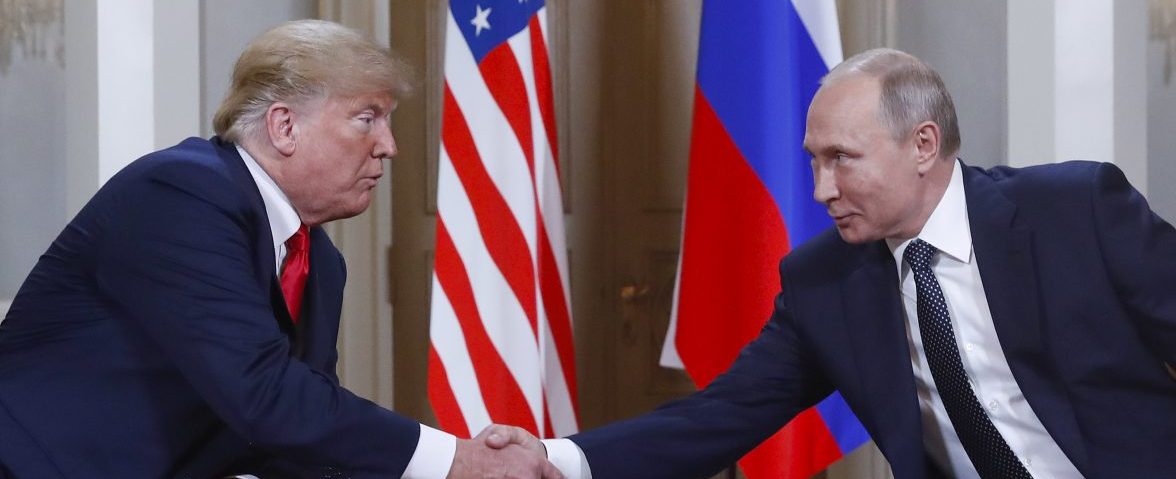MOSCOW — A few days before the summit in Helsinki, Finland, between President Trump and President Vladimir Putin of Russia, Yury Ushakov, one of Mr. Putin’s advisers, told journalists that this would be “the most important international event of the summer.”
The Kremlin had good reason to put an optimistic spin on the meeting: Mr. Putin had almost nothing to lose from the summit, and he had much to gain.
Russia’s president is under pressure at home right now. Despite easily winning re-election in March, his popularity has been slipping. He has even faced protests against his government’s pension reform plan. But one way that Mr. Putin knows how to appeal to Russians is by appearing tough and in control on the world stage. Mr. Trump made that easy for him.
Until Monday, Russia’s president was probably the last head of a powerful state who had not yet had a full-fledged one-on-one meeting with Mr. Trump. The two leaders have met twice on the margins of international events and have talked eight times over the phone, but the absence of an organized meeting between them was making Mr. Putin, ever eager to appear like a powerful global player, look like an outsider, especially after Mr. Trump even met with Kim Jong-un of North Korea.
The date chosen for the meeting was comfortable for Mr. Putin. After the NATO summit in Brussels and an official visit to London, Mr. Trump spent two days playing golf in Scotland before heading to Helsinki. No doubt the president enjoyed the free weekend, but Mr. Putin came away looking more important. While the American president was relaxing, Mr. Putin was finishing up business in Moscow, where he had assembled several heads of states and governments for the World Cup finals.
The venue also seemed to benefit the Russian side. The city discussed as a possible host for the summit was Vienna. It would have been approximately a three-hour flight away from both Scotland and Moscow, while Helsinki was at least an hour closer for Mr. Putin. This may sound like a small point but at symbolic international summits, such details matter.
And this summit was mostly about optics. Expectations for real policy deliverables were low on the Russian side. Although Mr. Trump is more popular in Moscow than in many capitals — especially in Europe — his erratic behavior and disregard for conventional diplomacy worry many people here, too.
The way Mr. Trump castigated American allies on the way to Helsinki and spoke with open admiration of his Russian counterpart also, of course, played into Mr. Putin’s hands. But when he tweeted hours before the summit that “Our relationship with Russia has NEVER been worse thanks to many years of U.S. foolishness and stupidity,” it was a gift Moscow would not even have hoped for. No wonder the Russian Ministry of Foreign Affairs reposted it with the words “we agree.”
Watching the joint news conference held by the two leaders, it was clear that Mr. Putin had the wind at his back. He made a far more confident impression than his American counterpart. In his opening statement, he articulated several concrete proposals — on arms control, terrorism, Syria and bilateral economic ties. Mr. Trump, on the other hand, devoted much of his initial statement to justifying his decision to meet with Mr. Putin in the first place.
This might have made sense given the debate over Russia in the United States — though I suspect that even Americans found the references to Hillary Clinton’s emails out of place — but for Russians, it was bizarre. Several Western countries have disputes with the Kremlin, over Ukraine, Syria, espionage and other issues, but their leaders regularly meet with Mr. Putin.
During the face-to-face meeting, Mr. Trump let Mr. Putin speak first (no arrangement was made concerning the order of speeches in advance), which created the impression that the Russian president was the host of the summit. The joint news also began with a lengthy statement from the Russian side. Add to that the fact that a Russian journalist got to ask the first question and it would be easy to forget that the presidents met on neutral territory.
Almost any outcome would have been easy for Mr. Putin to sell to the Russian public, but this will be especially helpful. And Mr. Putin needs this boost. On June 14, the government announced a controversial pension reform: It wants to raise the retirement age for men (from 60 to 65) and women (from 55 to 63) for the first time since Stalin. Mr. Putin’s popularity immediately took a hit. According to a state-run poll, the president’s approval rating fell to 62 percent from 77 percent by the end of June. The independent Levada Center had even worse news for Mr. Putin: According to its research, trust in the president had dropped below 50 percent for the first time in five years.
The success of the World Cup will probably help those numbers grow. But so will President Trump. Mr. Putin’s popularity at home has long been helped by his ability to present Russia as a superpower that deserves to be taken seriously. The meeting in Helsinki made him look like he was in charge.
First published at nytimes.com












